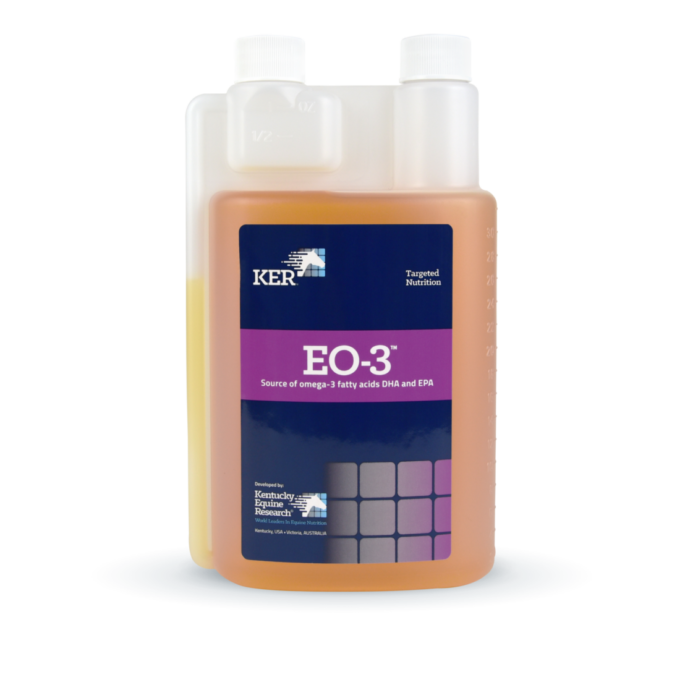Omega-3 Fatty Acids For The Veteran Horse

Advances in veterinary care means that horses are often living longer and more active lives than ever before. Nutrition plays an important role in the health of the senior horse, and supplementation of omega-3 fatty acids can be beneficial in providing anti-inflammatory support for common health issues such as osteoarthritis, equine metabolic syndrome (EMS) and laminitis.
What is an omega-3 fatty acid?
Omega-3 fatty acids are essential to the horses diet, and have to be supplied by a feed source as the horse is unable to produce them by themselves. Omega-3 fatty acids are long-chain polyunsaturated fatty acids (PUFAs) which help to provide structure to cell tissues and membranes throughout the body. Once utilised, omega-3 fatty acids can also help to regulate cell signalling, as well as producing immune system responses that reduce inflammation.
Types of Omega-3 fatty acid include :
- Alpha-linolenic acid (ALA)
- Docosahexaenoic acid (DHA)
- Eicosapentaenoic acid (EPA)
ALA has to be converted into DHA and EPA, but the efficiency of conversion is fairly low. Using sources of Omega-3 that are rich in DHA and EPA are therefore recommended.

EO-3 for the Veteran Horse
KER’s EO-3 is a palatable marine derived oil which contains the long chain omega 3 fatty acids DHA and EPA and is highly bio-available when compared to vegetable sources such as linseed. These sources can help manage and mediate anti-inflammatory responses in the veteran horse.
Managing Arthritis
For many years now glucosamine has been used to treat osteoarthritis. Studies have hinted that glucosamine can stimulate glycosaminoglycan synthesis which helps the reduce the extracellular matrix degradation, reduce pain, and improve stride length. However, the question of whether glucosamine slows down the degeneration of the joint is uncertain.
Omega-3 fatty acids such as DHA and EPA help to slow the progression of osteoarthritis with the reduction of inflammation, as well as aiming to slow down the degeneration of the articular cartilage in the joint (Curtis et al, 2000). Research in Texas (Manhart et al 2009) gave 16 mature horses with clinically diagnosed arthritis a concentrate feed that either included Omega-3 supplements or did not (control group) for 90 days. Blood samples found that compared to the control group, the treated group had a greater decrease in synovial fluid white blood cell concentration and plasma PGE2. Lower normalised plasma fibrinogen concentration was observed in treated horses compared with control horses throughout the entire trial. This shows that supplemental long-chain O3 in the equine diet could be advantageous for horses with existing arthritis. High levels of prostaglandin E2 (PGE2) can also inhibit bone matrix formation. Furthermore, joint pain can be found to reduce the horses stride length. Studies into supplementary EPA and DHA for horses diagnosed with osteoarthritis concluded with an eventual increase in stride length, suggesting that there had been a reduction in pain and inflammation in the joint.

Equine Metabolic Syndrome
One of the most common causes of laminitis and metabolic conditions in the older horse is high insulin levels in the blood and their reduced ability to regulate it. Fish oil as used in EO-3 has less calories than a vegetable oil, which not only aids in monitoring calorie intake but research has found it can also support glucose tolerance.
In human studies of obesity, (Simpoulous 2016) research revealed that a diet with reduced levels of omega-3 fatty acids increased the prevalence of being overweight or obese. It was also found that this could be reversed with increased intake of EPA and DHA. A balanced Omega-6/Omega-3 ratio is therefore important for health and in the prevention and management of obesity.
Furthermore, in equine studies (Hess et al 2013) marine derived omega-3 supplementation in 21 mares. In treated groups the insulin dysregulated mares all showed an increase in insulin sensitivity. This suggests that a marine derived fish oil such as EO-3 could be a useful tool in managing metabolic dysfunction, as it helps to improve insulin sensitivity and reducing inflammation in horses with metabolic syndrome.
NEED MORE GUIDANCE?
If you would like to speak to one of our qualified nutritionists for some immediate advice, please call our feed advice line on 01622 718 487.
Feed Advice Form
Complete our online form to receive a detailed nutritional plan for your horse or pony from one of our registered nutritionists.
Equinews
Stay up-to-date with the latest version of Equinews, a digital newsletter from Kentucky Equine Research











